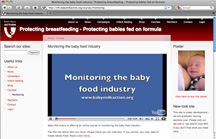Make a Mark in 2010
Baby Milk Action is highlighting the following three activities during 2010. See what we've done, what we're doing and how you can make your mark.

Strengthening the UK formula law
In the UK "aggressive promotion of breastmilk substitutes remains common."That was the verdict of the UN Committee on the Rights of the Child in 2008 in response to evidence we presented. In its progress report on the UK, the Committee called on the Government to strengthen formula marketing laws in line with international standards.
The Baby Feeding Law Group we brought together has been calling for the same and the Government has set up a review of the regulations in response to our work (we submitted evidence, such as the report shown left).
In 2010 we will:
• Produce updated reports showing how baby milk advertising and promotion undermine breastfeeding and mislead those who use formula.
• Campaign to make strengthening the law and improving maternity protection issues in the forthcoming election and for the government that is elected.
• Bring cases before the Advertising Standards Authority and Trading Standards and help others to do so - we have already won some important victories. For example, companies have had to stop some of the misleading claims about their products.
UPDATE on progress: We campaigned for a review commissioned by the Government on the operation of the law to consider evidence that this is failing to work properly. The enforcement authorities had submitted evidence, but the draft report had not responded to this adequately. The revised report was published on 11 March and now states: "The nature of the problems encountered when enforcing the Regulations should be characterised and steps taken to address these." The Government now has the justification it needs to change the law. During the General Election in May, the Liberal Democrats, Green Party and Scottish Green Party signed Baby Milk Action's pledge to work to bring the UK law into line with World Health Assembly requirements - click here.
Baby Milk Action attended the World Health Assembly in May to provide briefings to policy makers - a greatly strengthened Resolution was adopted that will be a valuable new tool for holding baby food companies to account - click here.
Online training
We have just launched this new website. Now we are preparing a monitoring training course for anyone who wants to know more about breastfeeding and breastmilk substitutes and the regulations companies should follow.
In 2010 we will:
• Add 8 modules to the site, consisting of film clips, online reading, quizzes and interaction with a tutor.
• Promote the course. Baby Milk Action members can do the first module free and receive a discount for the others. The course will help to raise money for the campaign.
• Help any partners in the International Baby Food Action Network (IBFAN) who want to adapt the course, while continuing to assist them in strengthening their laws.

Holding companies to account
We target Nestlé, the worst of the baby food companies, with a boycott and it is now one of the four most boycotted companies on the planet. This has forced some important changes, but Nestlé prefers to invest in trying to persuade people it is ethical. To strengthen the campaign, over the past few years we've built an international coalition of Nestlé Critics and brought a case against Nestlé at the UN (report shown left).
Danone became the second biggest baby food company after taking over Nutricia, Milupa and Cow & Gate in 2007 and it promised us that it would conduct a 'root and branch review' of the marketing practices of its new companies.
In 2010 we will:
• Pursue the case at the UN - and if, as we suspect, the voluntary system does nothing to improve things, expose this. Work within the UN, EU, European Union and elsewhere to defend breastfeeding and increase support for better regulations on formula companies.
• Campaign to stop abuses through consumer action, particularly Nestlé's new global marketing campaign. It is telling mothers that using its baby milk will protect their babies - it won't, they are more likely to become sick than breastfed babies and, in poor conditions, more likely to die.
• Analyse whether Danone really has made changes to marketing practices when the next global monitoring report is published by the IBFAN this year - and if not, join with our partners in launching a campaign to hold it to account.
Update on progress: We raised Nestlé's 'protect' strategy at the company's shareholder meeting on 15 April. Nestlé CEO defended the practice and admitted it is using it in 120 countries, proving it is a global strategy. Read our press release. We are raising the issue on a new leaflets that link to Nestlé product promotions for Pure Life bottled water and Fairtrade KitKat - available here. Coinciding with the annual demonstration at Nestlé (UK) HQ, we released an overview of how the UN Global Compact Office and Swiss Government dealt with our complaints - available here. We ran campaign Email Nestlé in June - stop its latest baby milk marketing scam and promoted this during UK Breastfeeding Awareness Week. Nestlé Global Public Affairs Manager is not only defending promoting baby milk with the claim it 'protects' babies, she has denied the World Health Assembly has introduced marketing standards (the International Code of Marketing of Breastmilk Substitutes was adopted in 1981 and in May 2010, the Assembly made a new call on companies to meet their responsibilities under the Code) - more pressure is needed. We are encouraging people to email Nestlé during International Nestlé-Free Week, which we are promoting for 25 - 31 October 2010.
Make a Mark in 2010
(If you can't make a donation at the moment - or already have - remember, you can also make a mark in 2010 by supporting our various campaign actions and spreading the word).
- Login to post comments







